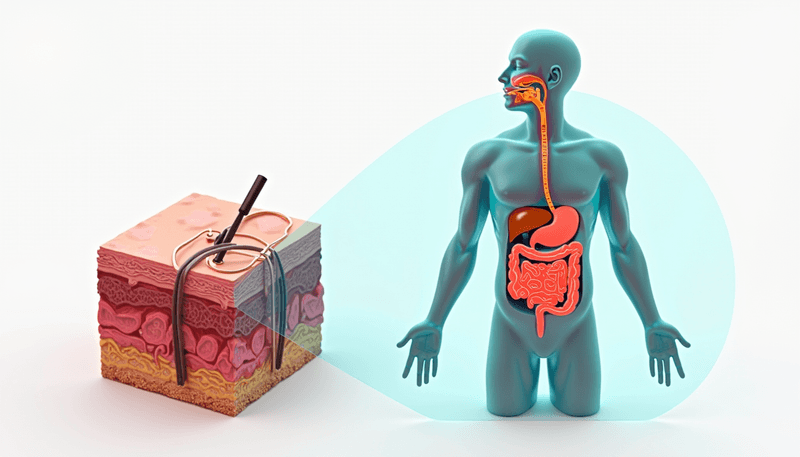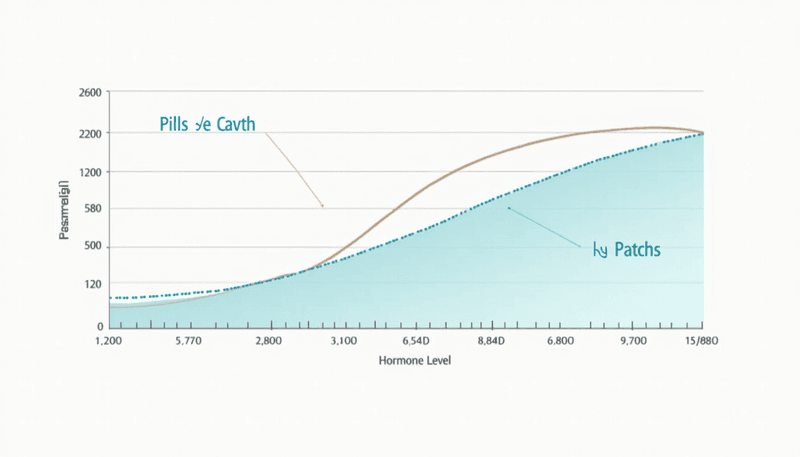Skin Patch vs Pills for Liver Health

Your liver might be whispering for help during menopause, but are you listening? As a physician who has dedicated my career to women's health, I've seen how the right choices in hormone therapy can make a world of difference. A groundbreaking study reveals that the way you receive your hormone therapy - through skin or by mouth - could significantly impact your liver health.
The Skin's Secret Advantage
Think of your liver as a careful doorkeeper for everything entering your body. When you take hormones as pills, they must first pass through this doorkeeper, potentially overwhelming it. But when hormones enter through your skin, they bypass this busy entrance and travel directly to where they're needed. The research shows that women using skin patches had a remarkable drop in liver fat - from 24% to 17.3% - while those taking pills saw an increase from 25.3% to 29.4%.
Have you noticed how medicine absorbed through your skin, like pain relief patches, often causes fewer side effects than pills?
This isn't just about numbers - it's about how your body processes hormones. When you use a patch, your body receives a steady, gentle stream of hormones, similar to how a slow-drip irrigation system waters a garden more effectively than dumping a bucket of water all at once.
The Cholesterol Connection
One fascinating discovery from the study involves how different hormone delivery methods affect your cholesterol levels. While oral hormones decreased total cholesterol, they also increased triglycerides - fats that can accumulate in your liver. It's like trying to clean your house but accidentally tracking mud through the front door.
Sarah, one of my patients, switched from pills to patches after experiencing unexplained fatigue. Within months, her liver function tests improved, and she reported feeling more energetic. Her experience aligns with the study's findings that patches maintain more stable blood fat levels.
"When I switched to patches, it felt like my body was working with the hormones rather than processing them."
- Sarah, age 52
Beyond the Liver: Full-Body Benefits
The research revealed something unexpected: women using patches maintained more stable weight and blood pressure levels. Think of it as choosing between a roller coaster ride (pills) and a gentle wave (patches) for your body's systems.
Key findings worth noting:
- Patch users showed minimal changes in body weight
- Blood pressure remained more stable with patches
- Liver fat decreased only in the patch group
As a doctor who has witnessed the frustration of weight fluctuations during menopause, these findings offer hope for better management strategies.
Making the Choice: Practical Steps
-
Talk to Your Healthcare Provider About:
- Your current liver health
- Family history of liver disease
- Previous reactions to hormones
- Lifestyle factors that might affect your choice
-
Monitor Your Body's Signals:
- Keep track of any digestive changes
- Note energy levels and weight fluctuations
- Document any skin reactions to patches
-
Consider Your Lifestyle:
- Do you prefer daily pills or weekly patch changes?
- Are you comfortable with adhesives on your skin?
- How sensitive is your stomach to medications?
What matters most to you when choosing hormone therapy: convenience, effectiveness, or minimal side effects?
The journey through menopause is unique for each woman. This research offers valuable insights into making it smoother, especially for those concerned about liver health. Whether you're just starting hormone therapy or considering a change, understanding these differences can help you make better-informed decisions.
Actionable First Step: Schedule an appointment with your healthcare provider to discuss your current hormone therapy method and whether a switch might benefit your liver health. Bring specific questions about patches versus pills based on your personal health history.
Remember, small changes in how we receive our hormones can lead to significant improvements in our overall health. Your liver will thank you for taking the time to make this informed decision.

Dr. Marcus Anthony Bennett
Dr. Marcus Bennett is a Seattle-based freelance medical writer and consultant specializing in mid-aged women's health. With a background in internal medicine and over a decade of experience in preventive care, he is dedicated to making complex health topics accessible. Dr. Bennett completed his MD at Johns Hopkins School of Medicine and residency at the University of Washington. His empathetic and evidence-based approach combines traditional medical expertise with a focus on health disparities, often incorporating practical lifestyle advice. Known for his clear, engaging communication, Dr. Bennett provides actionable insights to empower his audience.






